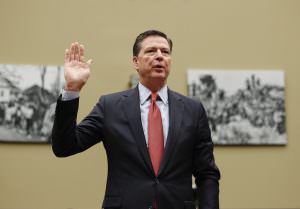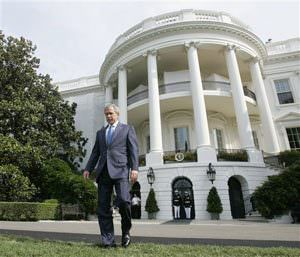Standing Up for Torture, at Home and Abroad
Sheldon Whitehouse, new to the Senate, was searching for what he called a "moment of moral clarity." Seated alongside the other members of the Senate Judiciary Committee in its crowded hearing room, the Rhode Island Democrat was looking in precisely the wrong place.WASHINGTON — Sheldon Whitehouse, new to the Senate, was searching for what he called a “moment of moral clarity.” Seated alongside the other members of the Senate Judiciary Committee in its crowded hearing room, the Rhode Island Democrat was looking in precisely the wrong place.
There is at the moment greater moral clarity to be found in the capital of Pakistan than there is at the U.S. Capitol.
In Islamabad, as well as in Lahore and throughout Pakistan, lawyers in their neat ties and sober business suits are beaten and hauled off to prison as they protest the crushing of the rule of law under Pervez Musharraf’s newest version of military dictatorship. In Washington, lawmakers in their neat ties and sober business suits dicker over whether Michael Mukasey’s refusal to recognize as torture the ancient atrocity of waterboarding is enough to disqualify the former federal judge from becoming the nation’s chief lawyer.
They’ve apparently decided that it isn’t.
This is a measure of how far we have fallen — a “slow and sickening slide” — as Whitehouse put it. The 11-8 Judiciary Committee vote in favor of Mukasey’s nomination as attorney general, which sends his name to the full Senate for near-certain approval, was foretold last week when Democrats Chuck Schumer of New York and Dianne Feinstein of California announced they would join Republicans in backing Mukasey. Their support came despite Mukasey’s refusal to state whether the interrogation technique of mock drowning — used during the Spanish Inquisition, long prosecuted by U.S. military courts, and condemned, when other countries do it, by the State Department — is in fact against the law.
The defecting Democrats’ arguments resonate with the same hollowness as the expressions of disappointment, but not outrage, with which the Bush White House has greeted the brutal crackdown perpetrated by Musharraf, a U.S. ally. The two senators argue that the Justice Department is damaged and rudderless in the aftermath of Alberto Gonzales’ miserable tenure as attorney general, an indisputable observation. Too many U.S. attorney posts are unfilled; so are too many top Justice leadership positions in Washington. Still, the essence of their position is this: Bush’s previous set of hand-picked leaders made such a mess of the Justice Department that the Senate must confirm Mukasey, lest the president promote even worse choices in the months ahead.
Schumer went an illogical step further and argued that, after all, Mukasey has privately promised to enforce a law explicitly defining waterboarding as torture if Congress chooses to pass one. The senator knows that this Congress has been impotent in its efforts to alter President Bush’s disastrous policy in Iraq, despite the public’s desire to change course. The same Congress has failed to effectively confront Bush’s assaults on the Constitution, whether they be detaining American citizens without charge or trial, or eavesdropping without warrants. It is, one might add, the very same Congress that cannot even get an expansion of health insurance for needy children past the president’s veto pen.
If Congress were to enact such an unnecessary measure — waterboarding already is illegal — Bush would be prone to choose confrontation. He could veto the measure, leaving leaders of the House and Senate with no clear way to put together sufficient votes for an override. In this presidential election season, leading Republican candidates already have declared themselves to be in favor of “aggressive” interrogation techniques. That is political code for abuse, if not outright torture. Congressional Republicans, having mostly backed the Bush administration’s breaches of human rights, do not seem likely to reverse course and abandon their party’s eventual 2008 standard-bearer.
Bush also could sign an anti-waterboarding measure, then issue one of his secret “signing statements” declaring that he doesn’t intend to obey it. Mukasey gave “totally unsatisfactory” answers about the use of such statements, said Arlen Specter, the judiciary panel’s ranking Republican. Then Specter voted for him anyway.
The Mukasey imbroglio comes at an apt time. The crisis in Pakistan is unfolding as if it were a documentary on what happens when bullying leaders obsessed with power go to extremes. Thousands of lawyers have been jailed; judges are under house arrest. They are in the vanguard of opposition to the suspension of democratic rule. They’ve chosen to sacrifice rather than succumb.
And here, in shameful contrast, our lawmakers have chosen to sacrifice their chance to create a moment of moral clarity to the cause of political expediency.
Marie Cocco’s e-mail address is mariecocco(at)washpost.com.
© 2007, Washington Post Writers Group
Your support matters…Independent journalism is under threat and overshadowed by heavily funded mainstream media.
You can help level the playing field. Become a member.
Your tax-deductible contribution keeps us digging beneath the headlines to give you thought-provoking, investigative reporting and analysis that unearths what's really happening- without compromise.
Give today to support our courageous, independent journalists.









You need to be a supporter to comment.
There are currently no responses to this article.
Be the first to respond.